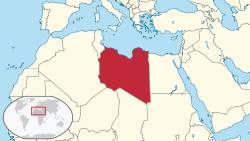Líbyà
Ìrísí
(Àtúnjúwe láti Libya)
Libia ليبيا | |
|---|---|
 | |
| Olùìlú | Tripoli |
| Àwọn èdè ìṣẹ́ọba | Arabic[a] |
| Spoken languages | Libyan Arabic, other Arabic dialects, Berber |
| Orúkọ aráàlú | Libyan |
| Ìjọba | Provisional authority |
• Chairman of the Presidential Council | Mohamed al-Menfi[3] |
| Abdul Hamid Dbeibeh | |
• Speaker of the House of Representatives | Aguila Saleh Issa |
| Independence | |
• Relinquished by Italy | 10 February 1947 |
24 December 1951 | |
| Ìtóbi | |
• Total | 1,759,541 km2 (679,363 sq mi) (17th) |
• Omi (%) | Negligible surface water, reservoirs of water underground. |
| Alábùgbé | |
• 2011 estimate | 6.6 million[4][5] (102nd) |
• 2006 census | 5,670,688[b] |
• Ìdìmọ́ra | 3.6/km2 (9.3/sq mi) (218th) |
| GDP (PPP) | 2010 estimate |
• Total | $90.841 billion[6] |
• Per capita | $13,846[6] |
| GDP (nominal) | 2010 estimate |
• Total | $71.336 billion[6] |
• Per capita | $10,873[6] |
| HDI (2010) | ▲0.755[7] Error: Invalid HDI value · 53rd |
| Owóníná | Dinar (LYD) |
| Ibi àkókò | UTC+2 (EET) |
| Ojúọ̀nà ọkọ́ | right |
| Àmì tẹlifóònù | 218 |
| ISO 3166 code | LY |
| Internet TLD | .ly |
a. ^ Libyan Arabic and other varieties. Berber languages in certain low-populated areas. The official language is simply identified as "Arabic" (Constitutional Declaration, article 1).
b. ^ Included 350,000 foreigners | |
Libya je orile-ede ni Ariwa Afrika.

|
Àyọkà yìí tàbí apá rẹ̀ únfẹ́ àtúnṣe sí. Ẹ le fẹ̀ jù báyìí lọ tàbí kí ẹ ṣàtúnṣe rẹ̀ lọ́nà tí yíò mu kúnrẹ́rẹ́. Ẹ ran Wikipedia lọ́wọ́ láti fẹ̀ẹ́ jù báyìí lọ. |
Itokasi
[àtúnṣe | àtúnṣe àmìọ̀rọ̀]- ↑ https://www.nationalanthems.info/ly.htm
- ↑ "Ẹda pamosi". Archived from the original on 2011-07-21. Retrieved 2011-10-23.
- ↑ "Interim Libya government assumes power after smooth handover". Ynet. 16 March 2021. Retrieved 16 March 2021.
- ↑ CIA Factbook: "6,597,960 (July 2011 est.); country comparison to the world: 102; note: includes 166,510 non-nationals "
- ↑ Department of Economic and Social Affairs Population Division (2009) (PDF). World Population Prospects, Table A.1. 2008 revision. United Nations. https://www.un.org/esa/population/publications/wpp2008/wpp2008_text_tables.pdf. Retrieved 2009-03-12.
- ↑ 6.0 6.1 6.2 6.3 "Libya". International Monetary Fund. Retrieved 2011-09-26.
- ↑ "Human Development Report 2010" (PDF). United Nations. 2010. Retrieved 2010-11-05.



